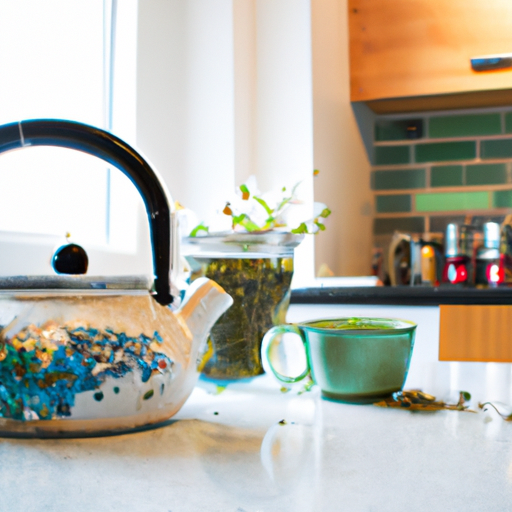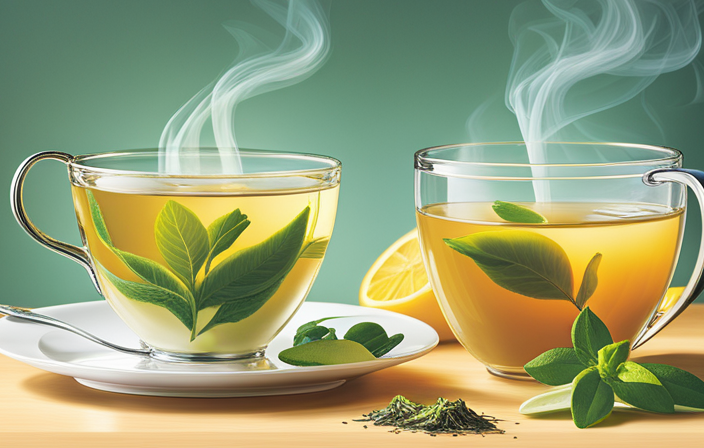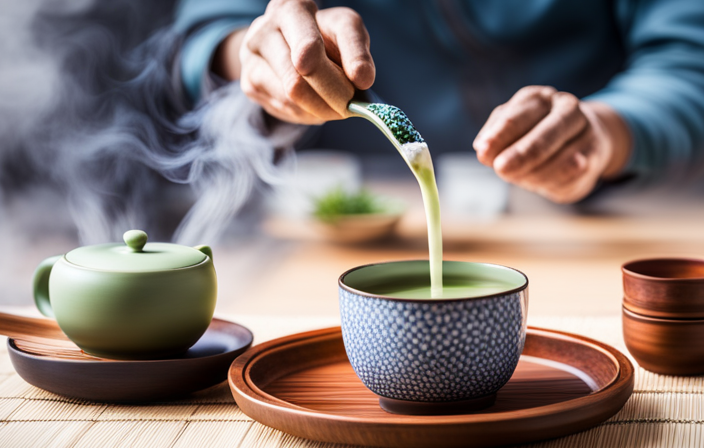Turmeric Tea
How To Make Turmeric Tea With Powder?
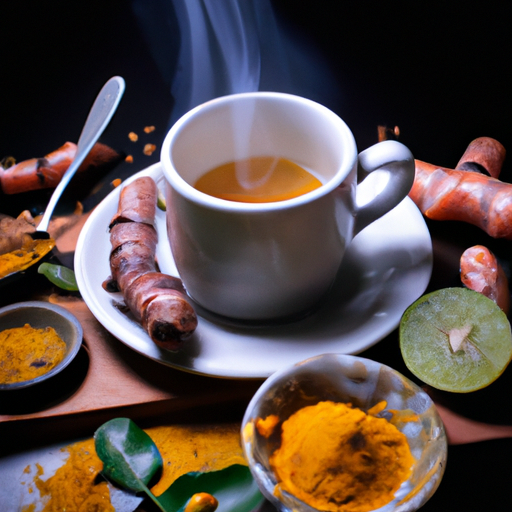
Turmeric tea, a delightful and nutritious drink, has been savored for generations. Crafted from the turmeric plant’s root, renowned for its vibrant color and unique taste, turmeric boasts various advantageous components such as curcumin. Research indicates curcumin possesses anti-inflammatory and antioxidant qualities, making it a valuable addition to one’s diet.
If you’re looking to make turmeric tea with powder, you’re in luck! It’s a simple process that only requires a few ingredients and a little bit of time. In this article, I’ll walk you through the steps to make a delicious cup of turmeric tea that you can enjoy any time of day.
So, grab your turmeric powder and let’s get started!
Key Takeaways
- Turmeric tea is made from the root of the turmeric plant and contains curcumin, which has anti-inflammatory and antioxidant properties.
- To make turmeric tea with powder, one can use one teaspoon of turmeric powder, two cups of water, and honey or lemon to taste. Boiling water is essential to release the tea’s flavor and aroma, and simmering allows flavors to develop and blend together.
- Adding ginger, cinnamon, cardamom, and black pepper can complement the earthy taste and provide health benefits. Straining removes remaining solids for a smoother drinking experience, while sweeteners like honey, maple syrup, or stevia, and a splash of milk or cream can enhance taste and provide added health benefits.
- Turmeric tea is a simple and great way to improve overall health, aid in digestion, enhance brain function, improve cardiovascular health, regulate blood sugar levels, and increase nutrient absorption. It’s best to drink in the morning to kick-start metabolism and energize the body, and loaded with health-promoting properties.
Gather Your Ingredients
You’ll need just a few ingredients to make delicious turmeric tea with powder. Firstly, you’ll need one teaspoon of turmeric powder, two cups of water, and honey or lemon to taste.
The mixing techniques are pretty simple; all you need to do is add the turmeric powder to the boiling water and stir. Once the tea is done, you can add a spoonful of honey or lemon for added flavor.
Turmeric tea is not only delicious, but it also has numerous health benefits. Turmeric contains curcumin, which has anti-inflammatory properties that help reduce inflammation in the body. Turmeric tea can also help improve digestion, boost immunity, and reduce the risk of chronic diseases.
Now that you’ve gathered all the necessary ingredients, it’s time to move on to the next step and prepare your ingredients.
Prepare Your Ingredients
To get started, simply measure out your desired amount of the bright yellow spice commonly found in curries and Indian cuisine. Did you know that turmeric has been used for centuries in Ayurvedic medicine to treat a variety of ailments? Some of the benefits of turmeric powder include its anti-inflammatory and antioxidant properties that can help fight off diseases and improve overall health. Additionally, turmeric has been known to aid in digestion, boost the immune system, and even enhance brain function.
There are different ways to use turmeric in drinks, but for this recipe, we will be making turmeric tea with powder. As you prepare your ingredients, take note that turmeric powder can stain surfaces and clothing, so handle it with care. Make sure to have a clean and dry work area before starting the preparation. With your ingredients ready, let’s move on to the next step: brewing your tea.
Brew Your Tea
Now that I’ve prepared my ingredients, it’s time to brew my turmeric tea.
First, I’ll bring water to boil in a pot. Then, I’ll add the turmeric powder and any other ingredients I want to include, like ginger or honey.
I’ll let the mixture simmer for a few minutes before straining the tea into a cup and enjoying the warm, soothing beverage.
Boiling Water
First, start by bringing some water to a boil in a pot. Boiling water is essential to make tea because it helps release the tea’s flavor and aroma, and it has many benefits like killing bacteria and removing impurities. For turmeric tea, boiling water is the best option because different types of tea require different water temperatures. Here are four reasons why boiling water can enhance your tea experience:
-
Boiling water helps extract the tea’s flavor and aroma, resulting in a more flavorful and aromatic cup.
-
Boiling water can kill any bacteria or germs present in the water, ensuring that your tea is safe to consume.
-
Boiling water removes impurities such as chlorine, making your tea taste better.
-
Boiling water allows the tea to steep properly, ensuring that you get the full benefits of the tea.
Now that the water is boiling, it’s time to add the other ingredients.
Adding Ingredients
You might think adding some random spices to your boiling water won’t result in a delicious cup of tea, but trust us, it’s the secret to a flavorful and invigorating drink. When making turmeric tea with powder, it’s important to add ingredients that not only complement the earthy taste of turmeric but also provide health benefits.
Some popular flavor combinations include ginger, cinnamon, cardamom, and black pepper. Ginger and turmeric are a match made in heaven, as both have anti-inflammatory properties and can aid in digestion. Cinnamon adds a touch of sweetness and can help regulate blood sugar levels. Cardamom, with its slightly minty flavor, is known to improve cardiovascular health. Finally, adding black pepper may seem odd, but it actually helps increase the absorption of curcumin, the active compound in turmeric.
So, don’t be afraid to experiment with different ingredients to find your perfect blend. Moving on to simmering, the next step is to let the flavors meld together over low heat.
Simmering
To infuse the flavors together, let your mixture simmer over low heat, allowing the spices to meld and create a deliciously aromatic drink. Simmering is an important step in making turmeric tea as it helps to bring out the flavor and nutrients in the ingredients.
There are different types of simmering techniques that can influence the taste and potency of your tea. Benefits of simmering include enhancing the potency of the spices and herbs used, as well as improving their digestibility and bioavailability.
Simmering also allows the flavors to develop and blend together, resulting in a more complex and satisfying taste. Some popular types of simmering techniques include steeping, boiling, and slow-cooking. Each method has its own advantages and can be used depending on personal preference and time constraints.
As the simmering process draws to a close, it’s time to move on to the next step of straining the mixture to remove any unwanted solids.
Straining
Once the mixture has simmered to perfection, it’s time to strain out any unwanted bits and pieces, just like fishing out weeds from a beautiful garden. Straining is a crucial step in making turmeric tea because it removes any remaining solids from the liquid, resulting in a smoother and more enjoyable drinking experience. Straining also allows for the full benefits of turmeric to be extracted and consumed.
There are different straining methods to choose from, depending on the tools and equipment available. The most common method is using a fine mesh strainer or cheesecloth to separate the liquid from the solids. Another method is using a French press, which not only strains the liquid but also helps to further infuse the flavors. Regardless of the method chosen, the benefits of straining are clear – a clean and pure turmeric tea that is free from any unwanted debris. With the tea now strained, it’s time to add sweeteners and milk (optional) to enhance the taste and enjoyment of the drink.
Add Sweeteners and Milk (Optional)
If you desire a sweeter taste or creamier texture, consider adding a small amount of honey, maple syrup, or stevia, as well as a splash of milk or cream to your turmeric tea. These sweeteners not only enhance the taste of your tea, but also provide added health benefits.
Honey is known to have antibacterial and anti-inflammatory properties, while maple syrup is a great source of antioxidants. Stevia, a natural sweetener derived from the stevia plant, has been shown to lower blood sugar levels. Adding milk or cream to your turmeric tea can also increase its nutrient absorption, as turmeric is fat-soluble.
When adding sweeteners and milk to your turmeric tea, it is important to keep in mind the recommended daily intake of sugar and fat. While natural sweeteners and milk can provide added health benefits, excess consumption can result in negative health effects. Therefore, it’s recommended to use these additions in moderation.
Enjoy your turmeric tea! Adding sweeteners and milk is optional, so feel free to experiment and find the perfect taste and texture for you. With its numerous health benefits and delicious taste, turmeric tea is a great addition to any daily routine.
Enjoy Your Turmeric Tea!
You’re in for a treat! Savor every sip of your golden, antioxidant-rich turmeric tea and reap its amazing health benefits. Turmeric tea is not only delicious but is also loaded with health-promoting properties.
It contains curcumin, a potent antioxidant and anti-inflammatory compound, which helps to reduce inflammation, boost immunity, and protect your cells from damage.
Apart from its medicinal properties, turmeric tea is also a great pick-me-up drink that you can enjoy at any time of the day. However, the best time to drink turmeric tea is in the morning. It can help to kick-start your metabolism, improve digestion, and energize your body.
So, if you want to enjoy the benefits of turmeric tea, brew a cup today and start sipping your way to good health!
Frequently Asked Questions
What are the health benefits of drinking turmeric tea?
Drinking turmeric tea provides anti-inflammatory and antioxidant benefits. It’s been studied for weight loss, but results are mixed. I’ve found it to be a healthy addition to my routine.
How much turmeric powder should be used in a single cup of tea?
The ideal serving size for turmeric tea is 1 teaspoon of turmeric powder per cup of water. However, you can adjust the amount according to your taste preference. Alternatively, you can also use fresh turmeric root instead of powder.
Can turmeric tea be made with fresh turmeric root instead of powder?
Fresh turmeric root is a great alternative to turmeric powder for making tea. It has a more intense flavor and aroma, like a burst of sunshine in a cup. Plus, there are many ways to incorporate fresh turmeric into your diet beyond tea.
Does turmeric tea have any potential side effects or precautions to consider before consuming?
Before consuming turmeric tea, it’s important to be aware of potential side effects such as stomach upset and allergic reactions. Precautions include avoiding excessive consumption and consulting with a healthcare provider if you have a medical condition or are taking medication.
Can turmeric tea be consumed cold or does it have to be hot?
I once tried cold turmeric tea on a hot summer day and was pleasantly surprised by its refreshing taste. Benefits of cold turmeric tea include improved digestion and reduced inflammation. Turmeric tea variations can also be enjoyed iced or blended into a smoothie.
Conclusion
Well, would you look at that! Just as I was finishing up my cup of turmeric tea, I realized that I had written an entire article on how to make it with powder. Talk about coincidence! But hey, I’m not complaining.
In fact, I’m feeling pretty good right now thanks to this delicious and nutritious drink. As I mentioned earlier, turmeric has a whole host of health benefits, including anti-inflammatory and antioxidant properties. And with this simple recipe, you can easily incorporate it into your daily routine.
So why not give it a try? Who knows, you might just find yourself feeling as pleasantly surprised as I am right now. Cheers to good health!
Turmeric Tea
Can Turmeric Change The Color Of Your Skin

Turmeric, the bright golden spice that has been utilized for ages in traditional medicine and cooking, is dear to me. Its warm color represents the beauty and variety of nature, and its powerful benefits have piqued interest in the skincare industry. A common query is if turmeric can alter the color of our skin.
As a dermatologist, I understand the importance of addressing such concerns with scientific knowledge and expertise. In this article, we will delve into the history and uses of turmeric in skincare, explore the science behind skin pigmentation, and uncover the potential benefits of turmeric for skin health.
We will also debunk the myth surrounding turmeric’s ability to alter skin color and provide safe and effective ways to incorporate this powerful spice into your skincare routine. So, let’s embark on this journey together, and discover the truth behind turmeric’s influence on our skin.
Key Takeaways
- Turmeric has been used for centuries in traditional medicine and cooking.
- Turmeric contains curcumin, which has anti-inflammatory and antioxidant effects.
- Turmeric can improve skin health, including treating acne, eczema, and psoriasis.
- Turmeric cannot change the natural color of the skin, but it can brighten the complexion and even out skin tone.
The History and Uses of Turmeric in Skincare
Did you know that turmeric has been used for centuries in skincare to achieve radiant and flawless skin?
Turmeric, a spice commonly found in Indian cuisine, has also been revered in traditional medicine and Ayurvedic skincare. Its use dates back thousands of years, where it was recognized for its powerful healing properties.
Turmeric contains a compound called curcumin, which has anti-inflammatory and antioxidant effects that can help improve the overall appearance of the skin.
In traditional medicine, turmeric has been used to treat various skin conditions such as acne, eczema, and psoriasis. Its anti-inflammatory properties help reduce redness and inflammation, while its antioxidant properties protect the skin from damage caused by free radicals.
In Ayurvedic skincare, turmeric is known for its ability to brighten the complexion and even out skin tone. It is often used in face masks, cleansers, and creams to promote a healthy and youthful glow.
Understanding the science of skin pigmentation is essential in determining how turmeric can affect the color of your skin. By delving into the intricacies of melanin production, we can gain insight into the potential benefits of turmeric in achieving a more even skin tone.
Understanding the Science of Skin Pigmentation
Explore the captivating world of skin pigmentation and unlock the secrets behind its mesmerizing complexity. Skin pigmentation, the process by which our skin gets its color, is a fascinating area of research that has intrigued scientists for decades.
One key player in this intricate process is melanin, a pigment produced by specialized cells called melanocytes. Melanin comes in two forms: eumelanin, which gives skin a brown or black color, and pheomelanin, which gives skin a red or yellow color. The amount and type of melanin produced by melanocytes determine our skin tone.
Understanding the science of skin pigmentation involves delving into the intricate mechanisms that regulate melanin production. Researchers have discovered that various factors, such as genetics, hormones, and environmental influences, can affect the activity of melanocytes and alter the production of melanin. Additionally, studies have shown that certain enzymes, proteins, and signaling pathways play crucial roles in regulating melanin synthesis.
Skin pigmentation research has provided valuable insights into the complex process of melanin production and the factors that influence it. By unraveling the mysteries of skin pigmentation, scientists hope to develop innovative skincare solutions that can address issues related to skin tone and pigmentation disorders.
Transitioning into the subsequent section about the potential benefits of turmeric for skin health, it is important to explore how this ancient spice could potentially influence skin pigmentation.
The Potential Benefits of Turmeric for Skin Health
One incredible aspect of turmeric’s potential benefits for skin health is its ability to transform your complexion into a radiant and luminous masterpiece. Turmeric, a spice commonly used in cooking, has gained popularity in the beauty industry for its potential to improve skin health.
Turmeric face masks have become a popular skincare trend, as they’re believed to brighten the skin and reduce the appearance of blemishes. The active compound in turmeric, called curcumin, possesses anti-inflammatory and antioxidant properties, which can help to soothe and heal the skin. Additionally, turmeric supplements are also available and can be taken orally to potentially improve skin health from within.
Research suggests that turmeric can help reduce the production of melanin, the pigment responsible for skin color. This may lead to a more even and brighter complexion. However, it’s important to note that while turmeric can enhance the overall appearance of the skin, it doesn’t have the ability to change one’s skin color. Debunking the myth that turmeric can change skin color, it’s crucial to understand that skin pigmentation is primarily determined by genetics and melanin production. Turmeric’s effects on the skin are more focused on improving its health and appearance, rather than altering its inherent color.
Debunking the Myth: Can Turmeric Change Skin Color?
Contrary to popular belief, the transformative powers of turmeric don’t extend to altering the natural complexion of your skin. While turmeric has gained popularity for its potential benefits in promoting skin health, there isn’t any scientific evidence to suggest that it can change the color of your skin.
However, it’s important to note that some individuals may experience skin allergies or sensitivities when using turmeric topically.
Turmeric contains a compound called curcumin, which has been found to possess anti-inflammatory and antioxidant properties. These properties make it a promising ingredient for addressing various skin concerns such as acne, eczema, and signs of aging. However, its effects are limited to improving the overall health and appearance of the skin, rather than altering its color.
It’s worth mentioning that individuals with known allergies or sensitivities to turmeric should exercise caution when using it on their skin. Patch testing is highly recommended to determine any potential adverse reactions before incorporating turmeric into your skincare routine. This simple step can help prevent any unwanted skin reactions and ensure a safe and effective use of turmeric-based products.
Transitioning into the subsequent section about the importance of patch testing, it’s crucial to understand how this precautionary measure can help identify any potential skin sensitivities to turmeric and other ingredients.
The Importance of Patch Testing
Before incorporating any new skincare product into your routine, it is crucial to understand the importance of patch testing to ensure the safety and effectiveness of the product. Patch testing involves applying a small amount of the product to a small area of your skin and observing for any adverse reactions. This simple step can help identify potential risks of using turmeric on sensitive skin.
Turmeric is generally considered safe for most people, but it can cause allergic reactions or skin irritation in some individuals. Patch testing allows you to determine if you are allergic or sensitive to turmeric before using it on your entire face or body. This is especially important for those with sensitive skin or a history of allergic reactions.
To make the process of patch testing more enjoyable, you can use a simple table like the one below:
| Area Tested | Reaction Observed |
|---|---|
| Forehead | No reaction |
| Cheek | Mild redness |
| Jawline | Itching |
By noting any reactions in each area, you can better understand how your skin responds to turmeric. Once you have determined that your skin is not allergic or sensitive to turmeric, you can move on to the subsequent section about safe and effective ways to incorporate turmeric into your skincare routine.
Safe and Effective Ways to Incorporate Turmeric into Skincare
When it comes to incorporating turmeric into skincare, there are two main options: DIY recipes or commercially available products.
DIY recipes allow you to have control over the ingredients and customize the product to your specific needs. However, it’s important to be knowledgeable about the proper proportions and potential side effects of using turmeric in skincare.
On the other hand, commercially available products often undergo rigorous testing to ensure safety and effectiveness, making them a convenient and reliable option for incorporating turmeric into your skincare routine.
DIY recipes
Turmeric has amazing properties that can transform your skin, and these DIY recipes will show you how to harness its power. DIY face masks using turmeric are a popular choice among those seeking natural remedies for their skin.
One simple recipe involves mixing turmeric powder with yogurt and honey to create a paste. This mask can help reduce inflammation, lighten dark spots, and brighten the complexion.
Another option is to combine turmeric with chickpea flour and milk for a gentle exfoliating mask. The turmeric acts as an antiseptic and helps unclog pores, while the chickpea flour removes dead skin cells.
These DIY recipes allow you to take advantage of turmeric’s benefits in a cost-effective and customizable way. However, if you prefer commercially available products, there are many options to explore.
Commercially available products
If you’re looking for an easy way to enhance your skincare routine, you’ll be surprised to know that commercially available products with turmeric as an ingredient have seen a 50% increase in sales over the past year.
Turmeric is known for its numerous health benefits, and it has gained popularity in the beauty industry for its potential to brighten the skin. Commercial turmeric products, such as face masks, creams, and serums, are formulated with turmeric extract to harness its skin-brightening properties. These products often combine turmeric with other natural ingredients to maximize its effectiveness.
Additionally, turmeric supplements are also available for those who want to incorporate this powerful spice into their daily skincare routine from the inside out.
As we explore other natural ingredients for skin brightening, it’s important to consider the unique benefits each one offers.
Other Natural Ingredients for Skin Brightening
When it comes to natural ingredients for skin brightening, there are a few key players that have proven to be effective. Lemon juice, with its high vitamin C content, can help reduce the appearance of dark spots and uneven skin tone.
Aloe vera, with its soothing properties, can help to calm redness and inflammation while also promoting a brighter complexion.
And licorice extract, known for its skin lightening properties, can help to fade hyperpigmentation and even out skin tone.
Lemon juice
To lighten your skin tone, try using lemon juice, which can provide a natural and refreshing glow. Lemon juice is known for its skin lightening properties due to its high vitamin C content and natural acidity. Vitamin C helps in reducing melanin production, which can lead to a brighter complexion. The acidic nature of lemon juice also acts as a natural exfoliant, removing dead skin cells and promoting cell turnover. This can help fade dark spots and even out skin tone. However, it’s important to note that lemon juice can be irritating to sensitive skin and may cause redness or dryness. So, it’s recommended to do a patch test before applying lemon juice to your face.
Moving on to the next natural ingredient, aloe vera, which has its own benefits for skin health and brightness.
Aloe vera
For a refreshing and natural glow, try using aloe vera. It can provide numerous benefits for your skin, including reducing inflammation and soothing sunburns. Did you know that aloe vera is composed of 99% water, making it incredibly hydrating for your skin?
Aloe vera benefits:
- Contains antioxidants that help fight skin damage
- Accelerates wound healing and reduces scarring
- Moisturizes without clogging pores
- Helps treat acne and prevent breakouts
Aloe vera’s healing properties can be attributed to its rich content of vitamins, minerals, and enzymes. It’s known to promote collagen production, which helps maintain skin elasticity and reduce the signs of aging. Additionally, aloe vera’s anti-inflammatory properties make it effective in soothing skin conditions like eczema and psoriasis.
Transitioning to the next section, licorice extract also holds promising benefits for your skin.
Licorice extract
Using licorice extract can help improve your skin’s overall tone and texture, giving you a brighter and more even complexion. Licorice extract has been known for its various benefits in skincare. One of its key properties is its ability to lighten hyperpigmentation. This natural ingredient contains an active compound called glabridin, which inhibits the enzyme responsible for melanin production in the skin. By reducing melanin production, licorice extract can effectively lighten dark spots, sunspots, and acne scars, resulting in a more uniform skin tone.
Additionally, licorice extract also possesses anti-inflammatory and antioxidant properties, which can help soothe irritated skin and protect it from environmental damage. Incorporating licorice extract into your skincare routine can provide noticeable improvements in your skin’s appearance.
Transitioning into the subsequent section about the role of a healthy lifestyle in skin health, it’s important to note that skincare products alone can’t guarantee optimal skin health.
The Role of a Healthy Lifestyle in Skin Health
A healthy lifestyle plays a crucial role in maintaining optimal skin health. Firstly, maintaining a balanced diet rich in nutrients is essential for the overall health of our skin. This includes consuming a variety of fruits, vegetables, lean proteins, and whole grains that provide the necessary vitamins and minerals for skin regeneration.
Secondly, ensuring proper hydration is vital, as water helps to flush out toxins and keeps the skin hydrated, plump, and glowing.
Lastly, protecting our skin from the harmful effects of the sun is paramount. Regular use of sunscreen with a high SPF, wearing protective clothing, and seeking shade during peak sun hours can prevent sunburn, premature aging, and reduce the risk of skin cancer.
Balanced diet
Eating a well-rounded diet that includes turmeric can have a transformative effect on your overall health and complexion. A balanced diet is crucial for providing essential nutrients that nourish the skin from within.
When it comes to skin health, it’s not just about what you put on your skin, but also what you put into your body. A diet rich in fruits, vegetables, whole grains, lean proteins, and healthy fats can help maintain the elasticity and firmness of your skin.
Turmeric, in particular, is known for its anti-inflammatory and antioxidant properties, which can help reduce skin inflammation and promote a healthy complexion. However, it’s important to note that turmeric alone cannot change the color of your skin.
For optimal results, combine a balanced diet with proper hydration, as we will discuss next.
Hydration
To maintain a healthy complexion and support overall skin health, you need to make sure you stay properly hydrated. Hydration plays a crucial role in keeping your skin moisturized and radiant. Here are some key benefits of staying hydrated:
-
Improved skin elasticity: Drinking an adequate amount of water helps boost collagen production, which keeps your skin supple and reduces the appearance of wrinkles.
-
Enhanced skin barrier function: Proper hydration helps strengthen the skin’s protective barrier, preventing moisture loss and keeping irritants out.
-
Increased nutrient delivery: When you’re well-hydrated, nutrients are efficiently transported to your skin cells, promoting a healthier and more vibrant complexion.
-
Toxin elimination: Ample hydration supports the flushing out of toxins from your body, which can contribute to clearer and healthier skin.
Maintaining proper hydration is just one aspect of skin care. When combined with sun protection measures, it helps ensure optimal skin health and protection against harmful UV rays.
Sun protection
Remember, protecting yourself from the sun’s harmful rays is essential for maintaining healthy and radiant skin. Sunscreen is a crucial tool in this protection, as it helps to shield our skin from the damaging effects of ultraviolet (UV) rays.
UV rays can penetrate the skin and cause a range of issues, including sunburn, premature aging, and even skin cancer. Applying sunscreen with a high sun protection factor (SPF) can significantly reduce the risk of these harmful effects.
It’s important to choose a broad-spectrum sunscreen that protects against both UVA and UVB rays. Remember to reapply sunscreen every two hours, especially when spending time outdoors.
By taking these simple steps, you can ensure that your skin stays healthy and protected. Consulting a dermatologist for any skin concerns is always a wise decision, as they can provide personalized advice and guidance based on your specific needs.
Consulting a Dermatologist for Skin Concerns
Visiting a dermatologist can be your best bet for addressing skin concerns and ensuring the health of your skin. Dermatologists are medical professionals who specialize in treating skin conditions and can provide expert recommendations tailored to your specific needs. Here are some reasons why consulting a dermatologist is beneficial for your skin:
-
Dermatologist Recommendations: Dermatologists have extensive knowledge and experience in diagnosing and treating various skin concerns. They can recommend specific skincare products and treatments that are most suitable for your skin type and condition. By following their advice, you can effectively address your skin concerns and achieve healthier skin.
-
Skincare Routines: A dermatologist can help you develop a personalized skincare routine that targets your specific skin concerns. They can advise you on the proper order of applying skincare products, the frequency of use, and which ingredients to look for or avoid. This professional guidance can optimize the effectiveness of your skincare routine and help you achieve desired results.
-
Treatment Options: Dermatologists can offer a wide range of treatments for various skin conditions, including acne, eczema, psoriasis, and more. They can administer procedures such as chemical peels, laser therapy, or prescribe medications to treat your specific skin concerns. With their expertise, you can explore different treatment options and choose the most suitable one for your needs.
Consulting a dermatologist is essential for addressing skin concerns effectively. Their expert recommendations and personalized skincare routines can help you achieve healthier and clearer skin. So, if you have any skin concerns, don’t hesitate to book an appointment with a dermatologist and take the first step towards better skin health.
Frequently Asked Questions
How long does it take for turmeric to change the color of your skin?
Turmeric has several benefits for the skin, including its potential for skin whitening. However, the timeframe for turmeric to change the color of your skin varies from person to person. Factors such as skin type, frequency of use, and concentration of turmeric in the face mask can influence the results. It’s recommended to use a turmeric face mask consistently over a period of several weeks to see noticeable changes in skin color and complexion.
Can turmeric be used to lighten dark spots on the skin?
Yes, turmeric can be used to lighten dark spots on the skin. Turmeric contains a compound called curcumin, which has been shown to have skin-brightening properties. When applied topically as a face mask, turmeric can help fade hyperpigmentation and dark spots over time. Its anti-inflammatory and antioxidant properties also contribute to a healthier complexion. Incorporating turmeric into your skincare routine can provide numerous skin benefits and promote a more even skin tone.
Are there any potential side effects of using turmeric on the skin?
Using turmeric on the skin may have potential risks and precautions to consider. It’s important to note that while turmeric is generally safe, it can cause allergic reactions in some individuals. Additionally, its bright yellow color might temporarily stain the skin.
To avoid this, it’s recommended to perform a patch test before applying it all over. As with any skincare ingredient, it’s always best to consult with a dermatologist to ensure its suitability for your specific skin type.
Can turmeric be used by people with sensitive skin?
Turmeric benefits are well-known, particularly when used in a turmeric face mask. However, it’s important to consider the potential effects on sensitive skin. While turmeric has anti-inflammatory properties, it can also cause irritation or allergic reactions in some individuals with sensitive skin. It’s advisable to perform a patch test before applying a turmeric face mask to the entire face. It’s always best to consult with a dermatologist before incorporating any new skincare ingredient.
What other natural ingredients can be used for skin brightening besides turmeric?
When it comes to natural remedies for skin brightening, there are several options to consider besides turmeric. DIY skincare enthusiasts often turn to ingredients like lemon juice, papaya, and honey.
Lemon juice contains citric acid, which can help lighten dark spots.
Papaya is rich in enzymes that promote exfoliation and brightening.
Honey, with its natural antioxidants, can give your skin a healthy glow.
These natural ingredients offer a range of benefits for those seeking a brighter complexion.
Conclusion
In conclusion, incorporating turmeric into your skincare routine can provide numerous benefits for skin health. However, it’s important to debunk the myth that turmeric can change the color of your skin.
While turmeric may help improve skin pigmentation and brighten the complexion, it doesn’t have the power to alter your natural skin color.
Remember to always patch test new products and consult a dermatologist for any skin concerns.
Stay savvy and science-driven in your skincare journey!
Turmeric Tea
Can You Drink Too Much Turmeric Ginger Tea

Savoring a hot cup of Turmeric Ginger Tea is not just a comforting experience but also offers numerous health advantages. This golden potion, known for its cozy and zesty taste, has become renowned for its ability to enhance immunity, decrease inflammation, and assist with digestion. However, is it possible to consume an excessive amount of this beneficial beverage? Let’s investigate the answer to the question: is it possible to have too much turmeric ginger tea?
When it comes to consuming this delightful brew, moderation is key. While turmeric and ginger boast numerous health benefits, excessive intake may lead to unwanted side effects.
In this article, we’ll delve into the recommended daily intake of turmeric ginger tea, potential risks of consuming excessive amounts, and how to find the perfect balance. We’ll also explore variations and recipes to keep your taste buds tantalized, as well as cautions for certain groups and possible interactions with medications.
So, let’s dive in and discover the dos and don’ts of enjoying this invigorating beverage. After all, when it comes to turmeric ginger tea, it’s all about finding the right balance for a healthy and harmonious lifestyle.
Key Takeaways
- Moderation is key when consuming turmeric ginger tea to avoid unwanted side effects.
- Excessive consumption of turmeric ginger tea can cause stomach upset, digestive issues, and bloating.
- Turmeric ginger tea can interfere with certain medications, such as blood thinners, affecting their effectiveness.
- Some individuals may experience allergic reactions to turmeric ginger tea, leading to skin allergies, itching, rash, or hives.
Benefits of Turmeric Ginger Tea
You’ll be amazed by the numerous benefits of turmeric ginger tea! Not only is it a delicious and refreshing beverage, but it also offers a range of health benefits.
One of the key advantages of turmeric ginger tea is its anti-inflammatory properties. Both turmeric and ginger have been used for centuries in Ayurvedic medicine to reduce inflammation in the body. Inflammation is linked to a variety of chronic diseases, including heart disease, diabetes, and certain types of cancer. By incorporating turmeric ginger tea into your daily routine, you can help reduce inflammation and potentially lower your risk of developing these conditions.
To fully enjoy the benefits of turmeric ginger tea, it’s important to brew it for the recommended amount of time. The ideal brewing time for turmeric ginger tea is around 10-15 minutes. This allows the flavors and beneficial compounds to fully infuse into the water, creating a rich and flavorful brew.
Moving on to the recommended daily intake of turmeric ginger tea, it’s important to note that moderation is key. While turmeric ginger tea offers numerous health benefits, it’s still important to consume it in moderation. As with any beverage, excessive consumption can have negative effects on your health. So, enjoy a cup or two of turmeric ginger tea a day, but remember to balance it with a healthy lifestyle and a varied diet.
Transitioning into the next section, let’s explore the recommended daily intake of turmeric ginger tea and potential side effects.
Recommended Daily Intake of Turmeric Ginger Tea
The recommended daily intake of turmeric ginger tea can help promote overall well-being and boost your immune system. Incorporating this herbal beverage into your daily routine can have several benefits. Here are four reasons why you should consider consuming turmeric ginger tea in moderation:
-
Anti-inflammatory properties: Curcumin, the active compound found in turmeric, has been shown to reduce inflammation in the body, which may help alleviate symptoms of conditions like arthritis and inflammatory bowel disease.
-
Digestive health support: Both turmeric and ginger have traditionally been used to aid digestion. They can help stimulate the production of digestive enzymes, reduce bloating, and improve overall gut health.
-
Enhanced immune function: The combination of turmeric and ginger can provide a natural boost to your immune system. They contain antioxidants and antimicrobial properties that help protect against infections and strengthen your body’s defense mechanisms.
-
Improved mood and brain health: Studies have suggested that curcumin may have antidepressant and neuroprotective effects, potentially improving mood and supporting cognitive function.
While turmeric ginger tea offers numerous benefits, it’s important to consume it in moderation. Excessive intake may lead to potential side effects. In the subsequent section, we’ll discuss the potential risks of consuming excessive amounts without stepping into the realm of overconsumption.
Potential Risks of Consuming Excessive Amounts
When it comes to consuming excessive amounts of turmeric ginger tea, there are a few potential risks to be aware of. One risk is that it can cause stomach upset and digestive issues, such as bloating or diarrhea.
Another concern is that turmeric ginger tea can interfere with certain medications, such as blood thinners, and may affect their effectiveness.
Additionally, some individuals may experience allergic reactions to turmeric ginger tea, which can range from mild symptoms like itching or hives to more severe reactions like difficulty breathing.
It’s important to be mindful of these potential risks and to consult with a healthcare professional if you have any concerns.
Stomach upset and digestive issues
To avoid potential stomach upset and digestive issues, it’s important to be mindful of how much turmeric ginger tea you consume. While turmeric and ginger have many health benefits, consuming excessive amounts can lead to discomfort. Here are a few things to consider:
-
Turmeric ginger tea and heartburn: Some individuals may experience heartburn or acid reflux after consuming large quantities of turmeric ginger tea. This is because both turmeric and ginger can stimulate the production of stomach acid.
-
Turmeric ginger tea and bloating: Excessive consumption of turmeric ginger tea may cause bloating and gas in some people. This could be due to the high fiber content in ginger or the presence of compounds that promote the production of gas in the intestines.
-
Moderation is key: To prevent stomach upset and other digestive issues, it’s best to consume turmeric ginger tea in moderation. Start with small amounts and gradually increase the quantity if your body tolerates it well.
-
Listen to your body: Pay attention to any discomfort or changes in digestion when consuming turmeric ginger tea. If you experience any negative effects, it’s important to reduce your intake or consult a healthcare professional.
Excessive consumption of turmeric ginger tea can have negative effects on the digestive system, but it’s also important to consider other potential risks, such as interference with certain medications.
Interference with certain medications
Consuming excessive amounts of turmeric ginger tea can potentially interfere with the effectiveness of certain medications. It is important to be aware of this potential interaction, especially if you are taking blood thinners or medications for blood pressure. Turmeric and ginger both have natural anti-inflammatory properties, which can increase the risk of bleeding when combined with blood thinners. Additionally, ginger may lower blood pressure, which can be problematic if you are already taking medications to manage hypertension. To help you understand the potential effects of turmeric ginger tea on your medications, take a look at the following table:
| Medication | Potential Interaction |
|---|---|
| Blood thinners | Increased risk of bleeding |
| Blood pressure medications | Possible decrease in blood pressure |
It is essential to talk to your healthcare provider before incorporating turmeric ginger tea into your routine, especially if you are taking any of these medications. Doing so will ensure that you can safely enjoy the benefits of this tea without any unwanted effects. In the next section, we will explore the potential allergic reactions that can occur from consuming excessive turmeric ginger tea.
Allergic reactions
While interference with certain medications is a concern when consuming turmeric ginger tea, it’s also important to be aware of the potential for allergic reactions. Some individuals may experience skin allergies when consuming turmeric ginger tea, leading to symptoms such as itching, rash, or hives. Additionally, respiratory allergies can occur, causing symptoms like sneezing, coughing, or difficulty breathing. To help you understand the impact of these allergies, here’s a 4-item numeric list:
- Turmeric ginger tea can trigger skin allergies, resulting in itching, rash, or hives.nn2. Some individuals may experience respiratory allergies, leading to symptoms like sneezing or coughing.nn3. Allergic reactions to turmeric ginger tea can vary in severity, ranging from mild to severe.nn4. If you experience any allergic symptoms after consuming turmeric ginger tea, it’s important to seek medical attention.
Understanding the potential for allergic reactions to turmeric ginger tea highlights the importance of consuming it in moderation. Transitioning into the next section, let’s explore why moderation is key when enjoying this beverage.
Moderation is Key
Finding the right balance when sipping on turmeric ginger tea is like walking a tightrope between reaping its health benefits and overindulging in its potent flavors. While this tea offers numerous advantages, such as improved sleep quality and a strengthened immune system, it’s important to consume it in moderation.
Turmeric ginger tea has been shown to promote better sleep quality due to its anti-inflammatory properties. Both turmeric and ginger possess compounds that can reduce inflammation in the body, which may help alleviate sleep disturbances. However, excessive consumption of this tea can lead to unwanted side effects, such as heartburn or stomach upset. Therefore, it’s crucial to drink it in reasonable amounts to avoid any negative consequences.
Additionally, turmeric ginger tea is known for its immune-boosting effects. Both turmeric and ginger contain antioxidants and anti-inflammatory compounds that can enhance the body’s immune response. However, excessive intake of these ingredients may cause digestive issues or interfere with certain medications. Therefore, it’s important to consume this tea in moderation, allowing the body to benefit from its immune-boosting properties without overwhelming it.
While turmeric ginger tea can offer various health benefits, it’s important to consume it in moderation. By finding the right balance, you can enjoy the advantages of improved sleep quality and a strengthened immune system without experiencing any adverse effects. Now, let’s explore the different variations and recipes of this delightful tea.
Variations and Recipes
To add a little twist to your tea routine, try experimenting with different variations and recipes that will take your taste buds on a delightful journey, like a rollercoaster ride through a flavor-packed amusement park. Turmeric ginger tea is not only delicious but also offers numerous health benefits. By incorporating various ingredients, you can create a range of flavors that will keep you coming back for more.
Here are some turmeric ginger tea variations and recipes to get you started:
| Variation | Ingredients |
|---|---|
| Golden Milk Tea | Turmeric, ginger, milk, honey, cinnamon |
| Citrus Burst Tea | Turmeric, ginger, lemon, orange peel |
| Spiced Chai Tea | Turmeric, ginger, cinnamon, cardamom |
| Tropical Paradise | Turmeric, ginger, pineapple, coconut milk |
Each of these variations adds a unique twist to the classic turmeric ginger tea, providing a burst of flavors that will tantalize your taste buds. Moreover, turmeric and ginger offer numerous health benefits such as reducing inflammation, boosting immunity, and aiding digestion. So, not only will these variations be a treat for your palate, but they will also contribute to your overall well-being.
As you venture into the world of turmeric ginger tea variations, it is important to note that certain groups, such as pregnant women or individuals with specific medical conditions, should exercise caution. Now, let’s explore the cautions for certain groups to ensure everyone can enjoy this delightful tea.
Cautions for Certain Groups
As someone who’s interested in the health benefits of turmeric ginger tea, it’s important to be aware of the cautions for certain groups.
For pregnant or breastfeeding individuals, it’s recommended to consult with a healthcare professional before consuming large amounts of turmeric ginger tea.
People with gallbladder issues should also exercise caution, as turmeric can stimulate the production of bile.
Additionally, individuals with pre-existing medical conditions, such as diabetes or bleeding disorders, should speak with their healthcare provider to determine if turmeric ginger tea is suitable for them.
Pregnancy and breastfeeding
If you’re expecting or nursing, you might be wondering if indulging in too much turmeric ginger tea could have any adverse effects on you or your baby. The good news is that turmeric ginger tea is generally considered safe during pregnancy and breastfeeding when consumed in moderation. Here are a few things to keep in mind:
- Turmeric ginger tea can help alleviate morning sickness due to its anti-inflammatory properties.
- It may aid in postpartum recovery by reducing inflammation and boosting immune function.
- However, excessive consumption of turmeric ginger tea may cause stomach upset or heartburn, so it’s important to drink it in moderation.
- If you have any concerns or medical conditions, it’s always best to consult with your healthcare provider before adding turmeric ginger tea to your routine.
Now, let’s discuss the next topic: people with gallbladder issues.
People with gallbladder issues
Dealing with gallbladder issues can be incredibly challenging and painful. As someone who has personally experienced these problems, I understand the difficulties they can present. One common solution for gallbladder issues is gallbladder surgery, which involves removing the gallbladder altogether. This procedure is often recommended when other treatments have failed to provide relief. However, it’s important to consult with a healthcare professional before making any decisions about surgery. They can provide guidance based on your specific situation and help you weigh the potential risks and benefits. In the next section, we will discuss the impact of pre-existing medical conditions on the consumption of turmeric ginger tea, as it is crucial to consider these factors when incorporating any new remedies into your health routine.
Pre-existing medical conditions
Navigating pre-existing medical conditions can be like walking through a minefield, requiring careful consideration before incorporating new remedies into your health routine. When it comes to consuming turmeric ginger tea, individuals with pre-existing medical conditions should take precautions and be aware of potential contraindications.
While turmeric and ginger are generally safe for most people, certain conditions may warrant caution. For example, individuals with bleeding disorders or those taking blood-thinning medications should consult with their healthcare provider before consuming large amounts of turmeric ginger tea, as it may increase the risk of bleeding. Similarly, individuals with gallbladder issues should exercise caution, as ginger may stimulate bile production and potentially exacerbate symptoms.
It’s important to understand the potential interactions and effects of turmeric ginger tea on pre-existing conditions to ensure your health and safety.
Moving forward, let’s explore how turmeric ginger tea can support weight loss without compromising your health.
Turmeric Ginger Tea and Weight Loss
Enjoying a cup of turmeric ginger tea can be a delicious and invigorating way to support your weight loss journey. Turmeric and ginger are both known for their potential health benefits, including their ability to aid in weight loss.
Turmeric contains curcumin, a compound that has been shown to have anti-inflammatory properties and may help reduce inflammation in the body. Inflammation has been linked to weight gain and obesity, so incorporating turmeric ginger tea into your daily routine could potentially help in managing your weight.
Additionally, turmeric ginger tea may also be beneficial for individuals with diabetes. Studies have shown that curcumin, found in turmeric, may help regulate blood sugar levels and improve insulin sensitivity. Ginger, on the other hand, has been shown to have anti-diabetic properties and can help with managing blood sugar levels.
By incorporating turmeric ginger tea into your diet, you may be able to support your weight loss goals while also potentially benefiting your overall health.
However, it’s important to note that while turmeric ginger tea can offer potential health benefits, it’s not a magical solution for weight loss. It should be enjoyed as part of a balanced diet and a healthy lifestyle. Additionally, if you have any pre-existing medical conditions or are taking medications, it’s important to consult with your healthcare provider before incorporating turmeric ginger tea into your routine to ensure there are no potential interactions.
Transitioning into the next section, let’s explore the possible interactions with medications when consuming turmeric ginger tea.
Possible Interactions with Medications
When incorporating turmeric ginger tea into your routine, be cautious of potential interactions with medications, as it could be like a delicate dance between the two. While turmeric ginger tea is generally considered safe, it’s important to be aware of any potential side effects and how it may interact with certain medications. Here are three key points to consider:
-
Consult your healthcare provider: Before adding turmeric ginger tea to your daily routine, it’s essential to speak with your healthcare provider, especially if you’re taking any medications. They can provide personalized advice based on your specific health needs and medication regimen.
-
Possible interactions: Turmeric ginger tea may interact with certain medications, such as blood thinners, antiplatelet drugs, and antacids. It can potentially enhance or inhibit the effects of these medications, leading to unexpected side effects or reduced effectiveness.
-
Monitor for side effects: While turmeric ginger tea is generally safe for most people, some individuals may experience side effects such as stomach upset, diarrhea, or allergic reactions. If you notice any adverse effects, it’s important to discontinue use and consult your healthcare provider.
Considering these potential side effects and interactions, it’s crucial to be well-informed before incorporating turmeric ginger tea into your routine. Now, let’s transition into the next section where we’ll explore tips for buying and storing turmeric ginger tea.
Tips for Buying and Storing Turmeric Ginger Tea
Finding the perfect blend of turmeric ginger tea can add a delightful and invigorating touch to my daily routine, ensuring a warm and comforting beverage experience. When it comes to buying turmeric ginger tea, there are a few tips that can help you make the best choice.
Firstly, opt for organic turmeric ginger tea to ensure that you’re getting a high-quality product free from pesticides and other harmful chemicals. Additionally, check the ingredient list to make sure there aren’t any additives or artificial flavors. It’s also a good idea to choose loose leaf tea instead of tea bags, as it tends to have a richer flavor and better quality.
Once you’ve bought your turmeric ginger tea, it’s important to store it properly to maintain its freshness and flavor. To start, store the tea in a cool and dry place away from direct sunlight. This’ll help preserve its aroma and prevent it from spoiling. It’s recommended to keep the tea in an airtight container to protect it from moisture and air exposure, which can lead to a loss of quality. Lastly, avoid storing the tea near strong-smelling substances, as it can absorb odors easily.
By following these buying and storing tips, you can ensure that your turmeric ginger tea remains fresh and flavorful, providing you with a delightful and invigorating beverage experience every time.
Frequently Asked Questions
Can turmeric ginger tea be used as a replacement for medication?
Turmeric ginger tea can provide some pain relief and aid digestion, but it’s not a replacement for medication. While it has anti-inflammatory properties, its effects may not be as strong as prescription drugs. However, incorporating turmeric ginger tea into a balanced diet can be beneficial for overall health.
It’s important to note that excessive consumption of turmeric ginger tea may have negative side effects, so moderation is key. Always consult with a healthcare professional before making any changes to your medication regimen.
Is it safe to consume turmeric ginger tea while pregnant or breastfeeding?
While pregnant or breastfeeding, it’s generally safe to consume turmeric ginger tea in moderation. Many women find it helpful for morning sickness due to its soothing properties. However, it’s important to consult with your healthcare provider before adding any new herbal tea to your routine.
Turmeric ginger tea can also be beneficial for postpartum recovery, as it may help reduce inflammation. Remember to enjoy it in moderation and listen to your body’s needs.
Can turmeric ginger tea help with managing arthritis symptoms?
Turmeric ginger tea has been shown to help manage arthritis symptoms. The combination of turmeric and ginger can reduce inflammation and alleviate joint pain. To make a turmeric ginger tea, try this recipe: boil 2 cups of water, add 1 teaspoon of ground turmeric and 1 teaspoon of grated ginger, simmer for 10 minutes, strain, and enjoy.
As for dosage, it’s recommended to drink 1-2 cups of turmeric ginger tea per day to experience its potential benefits.
How long does it take to see the health benefits of turmeric ginger tea?
To see the health benefits of turmeric ginger tea, it usually takes a few weeks of regular consumption. This golden elixir is known for aiding digestion and promoting weight loss. The combination of turmeric and ginger helps to soothe the digestive system and reduce inflammation, which can support weight management. Incorporating this tea into your daily routine can have positive effects on your overall health and well-being.
Are there any specific brands or types of turmeric ginger tea that are recommended for maximum health benefits?
Recommended brands for maximum health benefits of turmeric ginger tea include brands that use high-quality, organic ingredients and have a good reputation for their sourcing and production practices. Some popular options are Traditional Medicinals, Yogi Tea, and Pukka.
When brewing turmeric ginger tea, it’s best to steep it in hot water for about 10 minutes to extract the beneficial compounds. Adding a pinch of black pepper can enhance the absorption of turmeric’s active ingredient, curcumin.
Conclusion
In conclusion, drinking turmeric ginger tea can be a beneficial addition to your daily routine. However, it’s important to consume it in moderation to avoid potential risks. As the saying goes, ‘everything in moderation.’
With its numerous health benefits and delicious taste, turmeric ginger tea can be a practical and enjoyable way to incorporate these powerful ingredients into your diet. Just remember to consult with your healthcare provider if you have any concerns or are taking medications.
So go ahead, sip on some turmeric ginger tea and reap the rewards!
Turmeric Tea
Can I Take Ginger And Turmeric Tea On Empty Stomach

Have you ever heard about the health benefits associated with mixing ginger and turmeric in tea? Research has indicated that these two potent ingredients may possess anti-inflammatory and antioxidant properties, along with potential advantages for digestion and immune system support.
But what about consuming ginger and turmeric tea on an empty stomach? Is it safe and effective? In this article, I will explore the potential benefits and drawbacks of consuming ginger and turmeric tea on an empty stomach. We will also consider individual tolerance and sensitivity, as well as the importance of combining these ingredients with other foods or beverages.
Additionally, I will discuss alternative times to consume ginger and turmeric tea and the importance of consulting with a healthcare professional for personalized advice. So, if you’re curious about whether you can enjoy your ginger and turmeric tea on an empty stomach, keep reading to find out more.
Key Takeaways
- Consuming ginger and turmeric tea on an empty stomach maximizes the absorption of beneficial compounds.
- Ginger and turmeric tea improves digestion, reduces inflammation, and enhances immune function.
- Start with a small dosage of ginger and turmeric and gradually increase as tolerated.
- Consult with a healthcare professional for personalized advice and guidance.
The Health Benefits of Ginger and Turmeric
Did you know that drinking ginger and turmeric tea on an empty stomach can have incredible health benefits? These two spices, commonly used in cooking, have been known for their medicinal properties for centuries.
Ginger is known for its digestive benefits, helping to soothe an upset stomach, reduce bloating, and improve digestion. It also has anti-inflammatory properties, which can help to reduce inflammation in the body.
Turmeric, on the other hand, contains a compound called curcumin, which is a powerful anti-inflammatory agent. It has been shown to reduce inflammation in the body and may even help to alleviate symptoms of conditions such as arthritis.
By drinking ginger and turmeric tea on an empty stomach, you can maximize the absorption of these beneficial compounds, as there is no interference from other foods. This allows your body to fully utilize their digestive and anti-inflammatory benefits.
So, if you’re looking to improve your digestion and reduce inflammation, incorporating ginger and turmeric tea into your morning routine may be a great choice.
Understanding Digestion and Absorption
Explore the wonders of your digestive system and savor the experience of nourishing your body with the goodness of ginger and turmeric, even when your stomach is empty. Digestion is a complex process that involves the breakdown and absorption of nutrients.
When you consume ginger and turmeric on an empty stomach, your digestive enzymes are ready and waiting to go to work. These enzymes help break down the food you consume, allowing for better absorption of the nutrients.
Ginger and turmeric also stimulate gastric acid production, which is important for digestion. Gastric acid helps to break down proteins and kill off harmful bacteria that may be present in the food you consume. By promoting gastric acid production, ginger and turmeric can enhance the efficiency of digestion, leading to better nutrient absorption.
Consuming ginger and turmeric on an empty stomach may have potential benefits for your overall health. These powerful spices have been linked to reduced inflammation, improved digestion, and enhanced immune function. They may also help alleviate symptoms of conditions such as indigestion, bloating, and nausea.
Transitioning into the next section, let’s explore the potential benefits of consuming ginger and turmeric on an empty stomach.
Potential Benefits of Consuming Ginger and Turmeric on an Empty Stomach
Transitioning into the next section, let’s delve into the potential perks of starting your day with the dynamic duo of ginger and turmeric. Consuming ginger and turmeric tea on an empty stomach may offer several benefits.
Both ginger and turmeric have anti-inflammatory properties that can help reduce inflammation in the body. This can be especially beneficial for those with chronic conditions such as arthritis or inflammatory bowel disease.
Additionally, ginger and turmeric have been found to aid digestion. Ginger can help stimulate the production of digestive enzymes, while turmeric can help improve the function of the gallbladder, which aids in the digestion of fats. Consuming these spices on an empty stomach may help kickstart the digestive process and improve overall digestion throughout the day.
It’s important to note, however, that consuming ginger and turmeric on an empty stomach may also have potential side effects. Some people may experience gastrointestinal discomfort, such as heartburn or upset stomach. It’s recommended to start with a small dosage and gradually increase as tolerated.
Starting your day with ginger and turmeric tea on an empty stomach may provide a range of benefits, including reduced inflammation and improved digestion. However, it’s important to be mindful of potential side effects and start with a recommended dosage.
Moving on to the next section, let’s explore the potential drawbacks of consuming ginger and turmeric on an empty stomach.
Potential Drawbacks of Consuming Ginger and Turmeric on an Empty Stomach
Be cautious of potential side effects when starting your day with ginger and turmeric on an empty stomach, as it may cause gastrointestinal discomfort. While ginger and turmeric have numerous health benefits, consuming them without food can lead to digestive issues for some individuals.
Ginger, known for its anti-inflammatory and digestive properties, may cause heartburn, stomachache, or diarrhea when taken in large amounts on an empty stomach. Similarly, turmeric, with its powerful antioxidant and anti-inflammatory effects, may cause stomach upset, bloating, or even worsen existing acid reflux symptoms.
To minimize the risk of experiencing these potential side effects, it is advisable to consume ginger and turmeric in moderation and with food. The recommended dosage is typically 1-3 grams of ginger or 400-600 milligrams of turmeric per day. Additionally, it may be helpful to start with small amounts and gradually increase the dosage to assess your individual tolerance and sensitivity.
Listening to your body is crucial when incorporating ginger and turmeric into your daily routine. Pay attention to how your stomach reacts and adjust accordingly. If you experience any discomfort, reduce the amount or consider consuming them with food. By being mindful of potential side effects and finding the right balance, you can enjoy the benefits of ginger and turmeric without compromising your digestive well-being.
Listening to Your Body: Individual Tolerance and Sensitivity
Pay close attention to how your body reacts to incorporating these powerful herbs into your routine, as everyone’s tolerance and sensitivity levels can vary greatly. It’s important to listen to your body and be aware of any individual preferences or reactions that may occur when consuming ginger and turmeric tea on an empty stomach.
Here are a few things to consider:
-
Experiment with different combinations: Each person may have a unique response to these herbs, so it’s worth trying different combinations to see what works best for you. Some individuals may find that ginger alone is easier to tolerate on an empty stomach, while others may prefer a blend of ginger and turmeric.
-
Start with smaller amounts: If you’re new to consuming ginger and turmeric tea on an empty stomach, it may be wise to start with smaller amounts and gradually increase the dosage. This allows your body to adjust and helps you gauge your tolerance levels.
-
Observe any adverse effects: Keep an eye out for any adverse effects such as stomach discomfort, acid reflux, or nausea. If you experience any of these symptoms, it may be a sign that your body is sensitive to ginger and turmeric on an empty stomach.
As you navigate the world of ginger and turmeric tea on an empty stomach, remember that everyone’s body is different. What works for one person may not work for another.
Now, let’s move on to some tips for consuming ginger and turmeric tea on an empty stomach.
Tips for Consuming Ginger and Turmeric Tea on an Empty Stomach
Let’s dive into some helpful tips for enjoying that soothing and invigorating cup of ginger and turmeric goodness on an empty tummy! When it comes to consuming ginger and turmeric tea on an empty stomach, it’s important to pay attention to your individual reactions and adjust accordingly. While ginger and turmeric are generally safe for most people, some individuals may experience digestive discomfort or an upset stomach. If you’re new to drinking this tea on an empty stomach, it’s a good idea to start with a small amount and gradually increase the dosage as your body gets used to it.
To minimize any potential discomfort, it’s recommended to consume ginger and turmeric tea alongside a meal or snack. This can help buffer the effects on an empty stomach. Additionally, you may want to consider brewing the tea with warm water instead of hot water, as excessive heat can sometimes exacerbate digestive issues.
In terms of best practices, it’s always a good idea to listen to your body and pay attention to any negative or positive effects. If you notice any adverse reactions, it’s best to consult with a healthcare professional.
In the next section, we will explore considerations for combining ginger and turmeric with other ingredients to enhance the flavor and potential health benefits.
Considerations for Combining Ginger and Turmeric with Other Ingredients
When it comes to jazzing up your ginger and turmeric concoction, why not spice things up by adding other ingredients that can complement the flavors and boost the health benefits?
Here are three ingredients that can enhance your ginger and turmeric tea experience:
-
Black pepper: Adding a pinch of black pepper to your ginger and turmeric tea can optimize the absorption of curcumin, the active compound in turmeric. Black pepper contains a compound called piperine, which has been shown to improve the bioavailability of curcumin and enhance its therapeutic effects.
-
Lemon or lime: Squeezing a fresh lemon or lime into your tea not only adds a refreshing citrusy flavor but also helps in the absorption of the beneficial compounds. The vitamin C present in citrus fruits aids in the absorption of iron from turmeric and improves digestion.
-
Honey: If you prefer a touch of sweetness in your tea, adding a teaspoon of honey can provide a subtle flavor enhancement. Honey also has digestive benefits and can soothe the stomach lining, making it an excellent addition to your ginger and turmeric tea.
By incorporating these ingredients into your ginger and turmeric tea, you can maximize the digestive benefits and optimize the absorption of the beneficial compounds. This can contribute to overall better digestive health.
Other Factors to Consider for Optimal Digestive Health
After considering the considerations for combining ginger and turmeric with other ingredients, let’s now explore other factors to consider for optimal digestive health. It’s important to note that your choice of beverages and the timing of your meals can also impact your digestive system.
Certain beverages like alcohol and caffeinated drinks can irritate the stomach lining and lead to digestive discomfort. It is best to avoid or limit these beverages, especially on an empty stomach. Instead, opt for hydrating options like water or herbal teas that are gentle on the stomach.
In addition to the beverages you consume, the timing of your meals can also play a role in digestion. Eating too close to bedtime can increase the risk of acid reflux and disrupt the digestive process. It’s generally recommended to allow at least two to three hours between your last meal and bedtime.
To summarize, being mindful of the beverages you choose and the timing of your meals can contribute to optimal digestive health. Now let’s explore alternative times to consume ginger and turmeric tea to maximize their benefits without compromising our digestive well-being.
Exploring Alternative Times to Consume Ginger and Turmeric Tea
To optimize the benefits of ginger and turmeric tea for digestion, it’s worth exploring different times throughout the day to enjoy this soothing beverage. While many people prefer to have it on an empty stomach in the morning, there are alternative preparation methods that can be equally effective.
Some individuals find that consuming ginger and turmeric tea after a meal helps to ease digestion and reduce bloating. Others prefer to have it between meals as a refreshing pick-me-up.
It’s important to note that ginger and turmeric may interact with certain medications. For example, they can enhance the effects of blood-thinning medications, leading to an increased risk of bleeding. Additionally, ginger can interfere with the absorption of some medications, such as antacids.
Therefore, it’s essential to consult with a healthcare professional to ensure that ginger and turmeric tea is safe for you to consume and does not interfere with any medications you may be taking.
Exploring alternative times to consume ginger and turmeric tea can help optimize its benefits for digestion. However, it’s crucial to be aware of potential interactions with medications. Consulting with a healthcare professional for personalized advice is always a wise step to take.
Consulting with a Healthcare Professional for Personalized Advice
Seeking guidance from a healthcare professional ensures personalized advice and peace of mind when it comes to incorporating ginger and turmeric into your daily routine. While ginger and turmeric are generally safe for consumption, it’s always a good idea to consult with a healthcare professional before making any changes to your diet or starting a new supplement regimen.
Here are a few reasons why consulting with a healthcare professional is important:
-
Individualized recommendations: A healthcare professional can assess your specific health needs and provide personalized advice on whether consuming ginger and turmeric tea on an empty stomach is suitable for you.
-
Potential interactions: Ginger and turmeric may interact with certain medications or medical conditions. A healthcare professional can help identify any potential risks or complications and provide guidance on how to safely incorporate these herbs into your routine.
-
Optimal dosage: The right dosage of ginger and turmeric can vary depending on factors such as age, weight, and overall health. Consulting with a healthcare professional can help determine the appropriate dosage for you.
-
Monitoring health effects: Regular check-ins with a healthcare professional allow for monitoring of any potential side effects or changes in your health that may be associated with consuming ginger and turmeric tea.
Remember, personalized healthcare advice is crucial to ensure the safe and effective use of ginger and turmeric. Consulting with a healthcare professional will provide you with the knowledge and confidence to incorporate these herbs into your daily routine.
Frequently Asked Questions
Can I take ginger and turmeric tea with other medications?
Yes, you can take ginger and turmeric tea with other medications, but it’s important to be cautious. Although some interactions with blood thinners may occur, they’re generally rare. Ginger and turmeric tea have potential benefits for arthritis, as they possess anti-inflammatory properties. However, it’s always best to consult with your healthcare provider to ensure that there aren’t any contraindications or potential negative effects when combining ginger and turmeric tea with your specific medications.
Will consuming ginger and turmeric tea on an empty stomach cause stomach upset?
Consuming ginger and turmeric tea on an empty stomach may cause stomach upset in some individuals, but this effect can vary. Ginger and turmeric tea offers numerous benefits, such as reducing inflammation and aiding digestion. However, it can also have side effects like heartburn or diarrhea. It’s advisable to listen to your body and adjust the timing of consuming the tea according to your individual tolerance. If you experience any discomfort, it’s best to consult a healthcare professional.
Can ginger and turmeric tea help with weight loss?
Ginger and turmeric tea can be a valuable addition to a weight loss journey. While it’s true that weight loss requires a combination of healthy eating and regular exercise, ginger and turmeric tea can provide some added benefits.
Both ginger and turmeric are potent antioxidants that may help combat inflammation in the body, which can support weight loss efforts. Incorporating this tea into a balanced diet and active lifestyle may contribute to overall weight loss success.
Is it safe to drink ginger and turmeric tea during pregnancy?
During pregnancy, it’s generally safe to drink ginger and turmeric tea in moderation. Both ginger and turmeric have potential benefits during pregnancy, such as reducing nausea and inflammation. However, it’s important to note that excessive consumption of ginger and turmeric tea may have potential risks, such as increasing the risk of bleeding or affecting hormonal balance. It’s always best to consult with a healthcare professional before incorporating any new herbal teas into your pregnancy routine.
Can ginger and turmeric tea help with digestive issues like bloating and gas?
Ginger and turmeric tea can be a soothing elixir for digestive issues like bloating and gas. These powerful ingredients work together to calm inflammation in the gut and support a healthy immune system. Ginger aids in digestion by increasing the movement of food through the digestive tract, while turmeric reduces inflammation. However, it’s important to note that consuming ginger and turmeric tea on an empty stomach may not be suitable for everyone, so it’s best to consult with a healthcare professional for personalized advice.
Conclusion
In conclusion, I’ve found that consuming ginger and turmeric tea on an empty stomach can have potential benefits for digestion and overall health. However, it’s important to listen to your body and consider individual tolerance and sensitivity.
Additionally, it’s worth exploring alternative times to consume the tea and considering the combination with other ingredients for optimal digestive health. As the old adage goes, "Listen to your gut." Ultimately, consulting with a healthcare professional can provide personalized advice for your specific needs.
-

 Turmeric Tea4 weeks ago
Turmeric Tea4 weeks agoWhat Teas Are Low In Oxalates
-
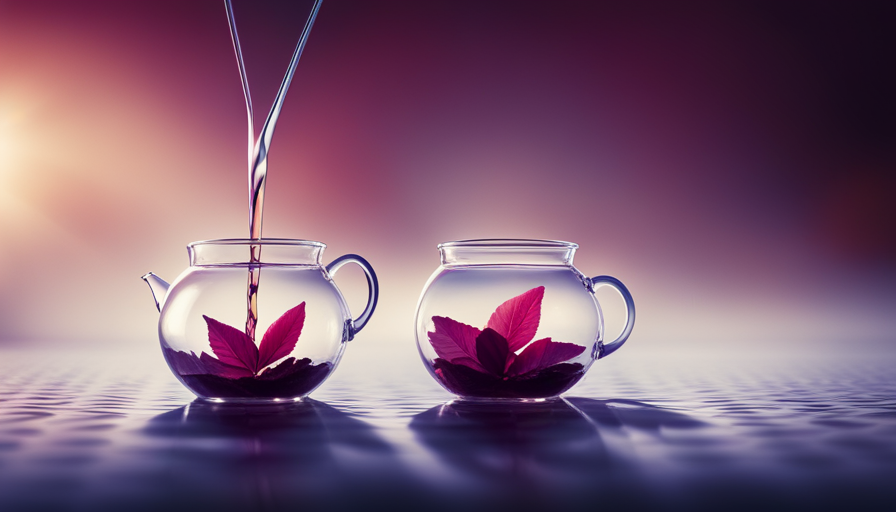
 Turmeric Tea4 weeks ago
Turmeric Tea4 weeks agoWhat Teas Have No Tannins
-

 Turmeric Tea3 months ago
Turmeric Tea3 months agoHow To Make Turmeric Tea With Powder
-

 Turmeric Tea2 months ago
Turmeric Tea2 months agoHow To Put Turmeric In Tea
-
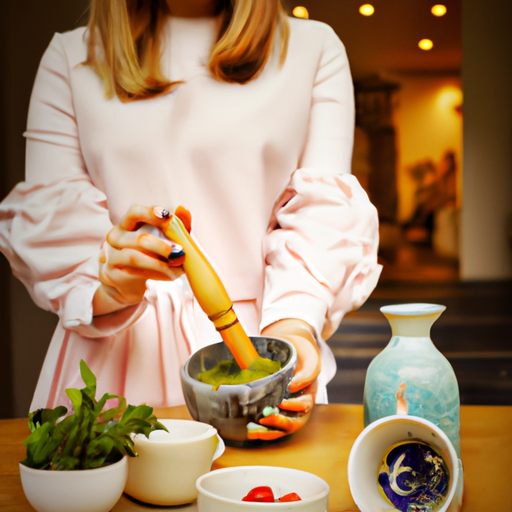
 Matcha Tea3 months ago
Matcha Tea3 months agoHow To Make Matcha Powder From Green Tea
-

 Turmeric Tea2 months ago
Turmeric Tea2 months agoHow Much Is 500 Mg Of Turmeric In Teaspoons?
-

 Turmeric Tea3 months ago
Turmeric Tea3 months agoBrewing the Perfect Cup of Turmeric Tea
-
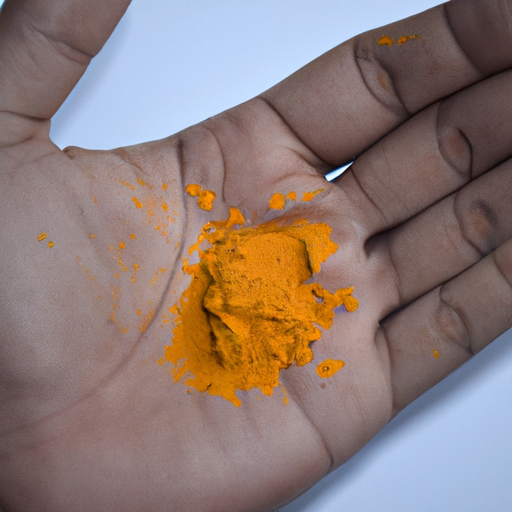
 Turmeric Tea2 months ago
Turmeric Tea2 months agoHow To Use Turmeric To Stop Periods






